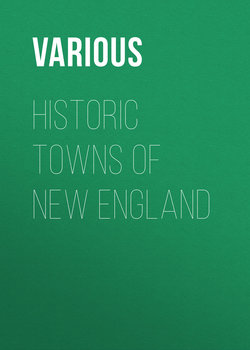Historic Towns of New England

Реклама. ООО «ЛитРес», ИНН: 7719571260.
Оглавление
Various. Historic Towns of New England
INTRODUCTION. By GEORGE PERRY MORRIS
PORTLAND “THE GEM OF CASCO BAY” By SAMUEL T. PICKARD
OLD RUTLAND, MASSACHUSETTS. THE CRADLE OF OHIO. By EDWIN D. MEAD
SALEM. THE PURITAN TOWN. By GEORGE DIMMICK LATIMER
BOSTON. THE TRIMOUNTAIN CITY. By THOMAS WENTWORTH HIGGINSON
REVOLUTIONARY BOSTON “Then and there American Independence was born.” By EDWARD EVERETT HALE
CAMBRIDGE. By SAMUEL A. ELIOT
CONCORD. FIRST IN MANY FIELDS. By FRANK B. SANBORN
PLYMOUTH. THE PILGRIM TOWN. By ELLEN WATSON
CAPE COD TOWNS. FROM PROVINCETOWN TO FALMOUTH. By KATHARINE LEE BATES
DEERFIELD. OLD POCUMTUCK VALLEY. By GEORGE SHELDON
NEWPORT. THE ISLE OF PEACE. By SUSAN COOLIDGE
PROVIDENCE. THE COLONY OF HOPE. By WILLIAM B. WEEDEN
HARTFORD “THE BIRTHPLACE OF AMERICAN DEMOCRACY” By MARY K. TALCOTT
NEW HAVEN “THE CITY OF ELMS” By FREDERICK HULL COGSWELL
Отрывок из книги
FROM the earliest days of the New England Colonies down to the present time, those European analysts of our national life, whose opinions have been based on personal observation, have usually conceded that in New England towns and villages one might, at almost any period of their history, find a higher average degree of physical comfort, intelligence and mental attainment, and political liberty and power than was or is to be found in any other communities of Christendom. Thus Alexis de Tocqueville, in 1835, wrote:
“The existence of the townships of New England is, in general, a happy one. Their government is suited to their tastes, and chosen by themselves… The conduct of local business is easy… No tradition exists of a distinction of ranks; no portion of the community is tempted to oppress the remainder; and the abuses which may injure isolated individuals are forgotten in the general contentment which prevails… The native of New England is attached to his township because it is independent and free; his co-operation in its affairs ensures his attachment to its interest; the well-being it affords him secures his affection, and its welfare is the aim of his ambition and of his future exertions. He takes a part in every occurrence in the place; he practises the art of government in the small sphere within his reach; he accustoms himself to those forms which can alone ensure the steady progress of liberty; he imbibes their spirit; he acquires a taste for order, comprehends the union of the balance of powers, and collects clear practical notions on the nature of his duties and the extent of his rights.”1
.....
“That to the end that learning may not be buried in the graves of our forefathers, it was ordered in all the Puritan colonies that every township, after the Lord hath increased them to the number of fifty households, shall appoint one to teach all children to write and read; and when any town shall increase to the number of one hundred families, they shall set up a Grammar School, the master thereof to be able to instruct youth so far as they may be fitted for the University.”
Nine years earlier, in 1638, the same body had founded a college (Harvard) at Cambridge, in order, as they said, that “the light of learning might not go out, nor the study of God’s word perish.” These two acts of the General Court may be reckoned as the germs from which has developed that system of secondary and higher education which has given Massachusetts the place of leader in the history of education in America.
.....